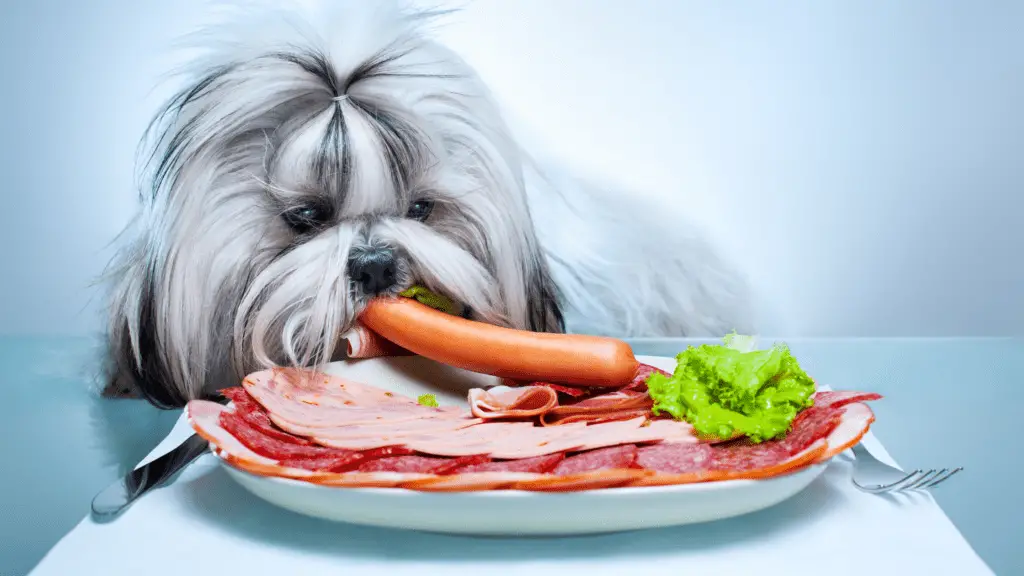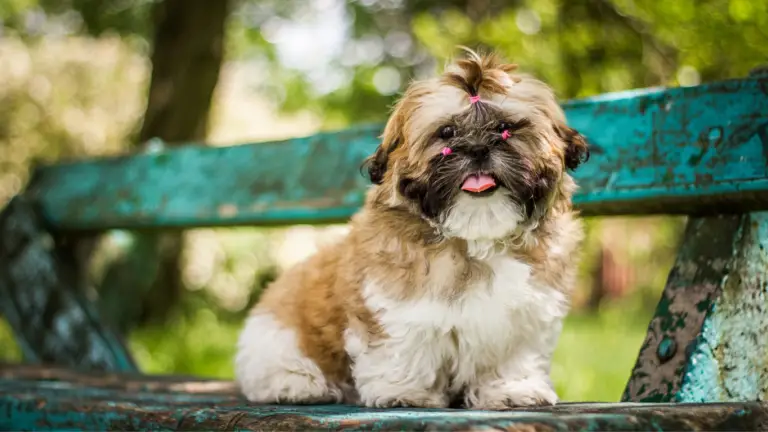Shih Tzus are a small breed of dog with adorable looks and a fun personality. They are most known for their glossy coat and their fierce, energetic, and loving temperament. But, they are also known to be quite picky eaters.
If you own a Shih Tzu, you want to make sure that your dog is getting his daily nutrition. Ensuring that your Shih Tzu gets high-quality meals that are safe for him is crucial for maintaining your dog’s health and helping them lead a healthy, happy life.
This article presents a helpful guide on Shih Tzu best foods, their feeding requirements, and foods to avoid to help you provide the best nutrition for your Shih Tzu.

What Should You Feed Your Shih Tzu?
As we mentioned earlier, Shih Tzus can be fussy eaters. They can be quite picky and unpredictable about what they eat. This is especially true for adult Shih Tzus. They often need a selective diet of high-quality foods.
However, it is also important to note that Shih Tzu is a brachycephalic breed, which not only affects their breathing but may also cause eating issues. Shih Tzus also have an underbite. This is why it is important to ensure that your Shih Tzu has foods that are easy to chew.
Apart from this, Shih Tzus require a diet that’s rich in protein and healthy fats to maintain their muscles and energy. However, as these dogs are more prone to obesity than other breeds, they should not be fed too many carbohydrates.
Ingredients For A High-quality Shih Tzu Diet
Shih Tzu’s main lean protein sources are chicken meal, eggs, turkey, and chicken.
These are also among Shih Tzu favorite foods.
Fish should also form a major component of their diets as it’s rich in protein, healthy fats, and omega 3 and 6.
Sweet potatoes, rice, barley, and oats are all good sources of carbs for Shih Tzus.
Also, make sure your dog gets a generous helping of fresh veggies and whole grains to satisfy his mineral and vitamin requirements.
Shih Tzu best food:
Lean meat
Fish
Eggs
Blueberries, raspberries, strawberries, and blackberries (in moderation)
Watermelon and melon
Kiwi, oranges, pears
Sweet potato
Veggies like spinach, broccoli, celery, asparagus, green beans, and peas
Cottage cheese
Baby carrots
White or brown rice
Foods To Avoid
While it may seem like dogs can and will eat anything and everything, there are some foods that are toxic to all dogs, including Shih Tzus.
Here is some Shih Tzu food to avoid:
Chocolate
Raisins, grapes, and currants
Macadamia nuts
Onions
Fruit seeds and pits
Sweets and candies that include xylitol (an artificial sweetener that boosts insulin production)
Mushrooms
Raw eggs
Cooked bones
Tea, coffee, soda
Bread dough
Mustard seeds
Avocado
Cherries
How much food is sufficient for Shih Tzu?
How much food to give your Shih Tzu will largely depend on its age, activity level, body structure, and metabolism.
Ideally, you should be feeding your Shih Tzu half to one cup of dry food.
For puppies, you should feed them one ounce of food per pound of their body weight.
For an adult Shih Tzu, a half-ounce of food per pound of body weight is recommended.
This is because Shih Tzu puppies consume more food during their growing years than adult Shih Tzus. In their early years, puppies are more active and thus need more energy and calories.
You can also weight your puppy to better calculate the amount of food they should be fed.
A healthy Shih Tzu weighs between 10 and 16 pounds. For every pound of body weight, you should be feeding your Shih Tzu 35 calories. For elderly dogs, approximately 30 calories per pound of body weight are sufficient.
How Often Should You Feed a Shih Tzu?
When determining the feeding schedule for your Shih Tzu, their age will play a major role. It will also help determine how many snacks and other foods you should give him and when.
Shih Tzu Puppies: Under Three Months Old
For puppies, one of the most commonly used feeding methods is to free-feed.
This strategy allows your pup to always have fresh food available. This method is implemented at an early age because toy breed pups, like Shih Tzus, are prone to hypoglycemia, which causes their blood sugar to drop rapidly. This can happen if the puppy is not fed for too long.
Make sure that you do not add more food on top of existing food in your puppy’s bowl. This will only lead to old, stale food accumulating at the bottom and may cause illness. Allow the bowl to empty out, and then clean the bowl thoroughly. Make sure the bowl is dry and then add more kibble.
In the first month or so, you may have to continuously remind your puppy where his water and food bowls are. This will also encourage him to munch throughout the day.
Shih Tzu Puppies: 3 to 12 months
In the first year, your Shih Tzu puppy is still growing and will be expending a lot of energy. He will also need more food to grow strong and healthy.
So, after the first month of free-feeding, you must feed your puppy three meals every day.
How much to feed Adult Shih Tzus?
If you’re feeding your adult Shih Tzu dog snacks and treats during the day along with plenty of training, feeding him two meals per day can be enough.
However, it is recommended to feed an adult Shih Tzu three meals per day.
Final Words
Feeding your Shih Tzu a nutritious diet of high-quality, healthy foods is essential to ensure his health and well-being. Whether you are planning to get store-bought kibble or feed your Shih Tzu homemade meals, make sure you keep an eye on the ingredients being included.
You should also ensure that your Shih Tzu’s water and food bowls are cleaned regularly and properly dried to avoid bacterial infections. If you find any sudden changes in the eating habits of your pup, get him to a vet immediately.












